选择性必修三 Unit 3 Environmental Protection - Discover useful structures(33张PPT)
文档属性
| 名称 | 选择性必修三 Unit 3 Environmental Protection - Discover useful structures(33张PPT) |
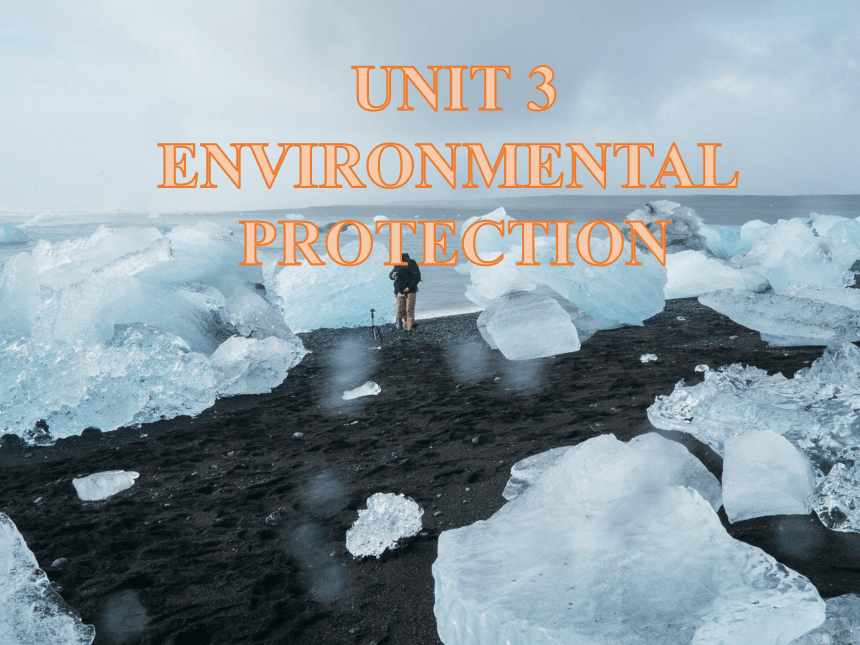
|
|
| 格式 | pptx | ||
| 文件大小 | 1.8MB | ||
| 资源类型 | 试卷 | ||
| 版本资源 | 人教版(2019) | ||
| 科目 | 英语 | ||
| 更新时间 | 2022-02-05 17:50:29 | ||
图片预览



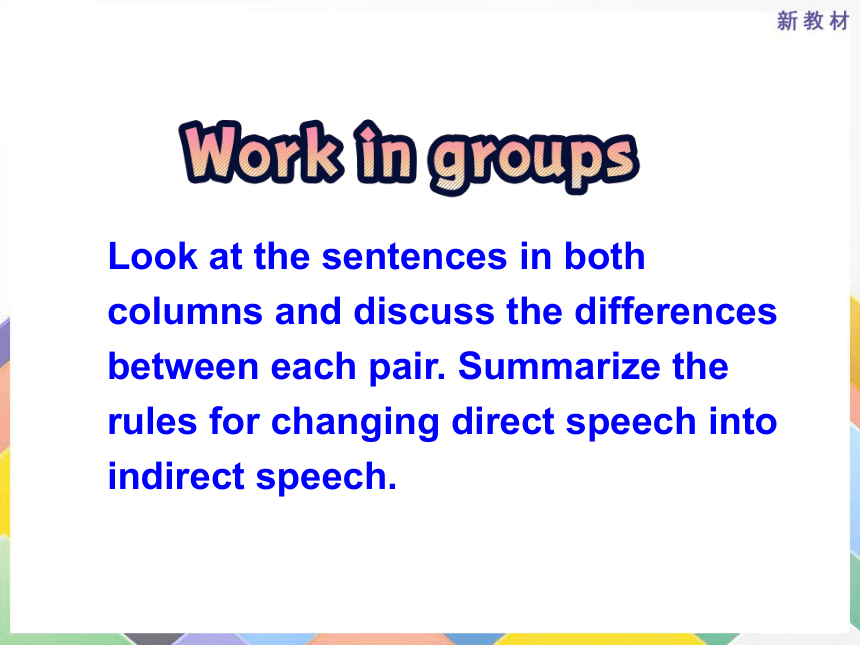
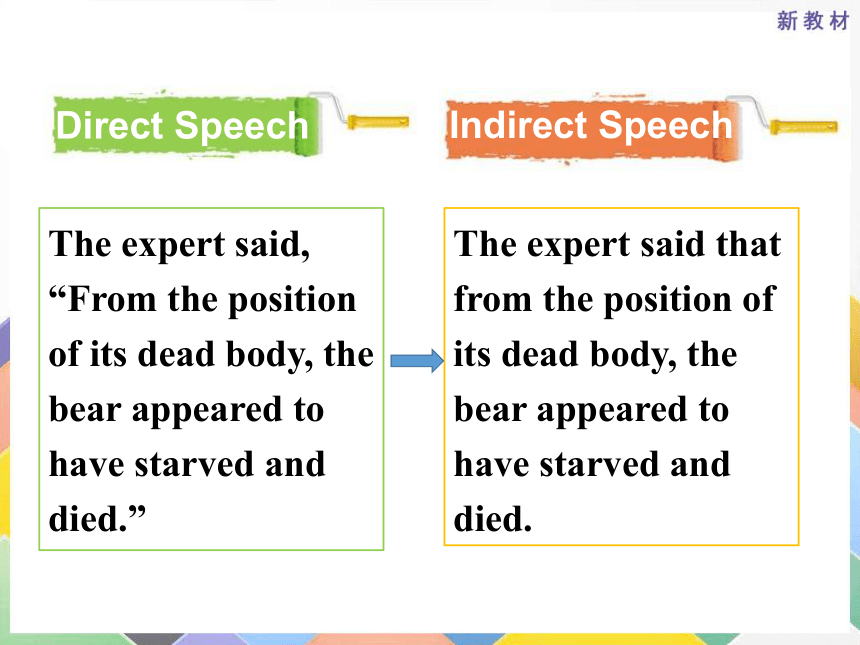
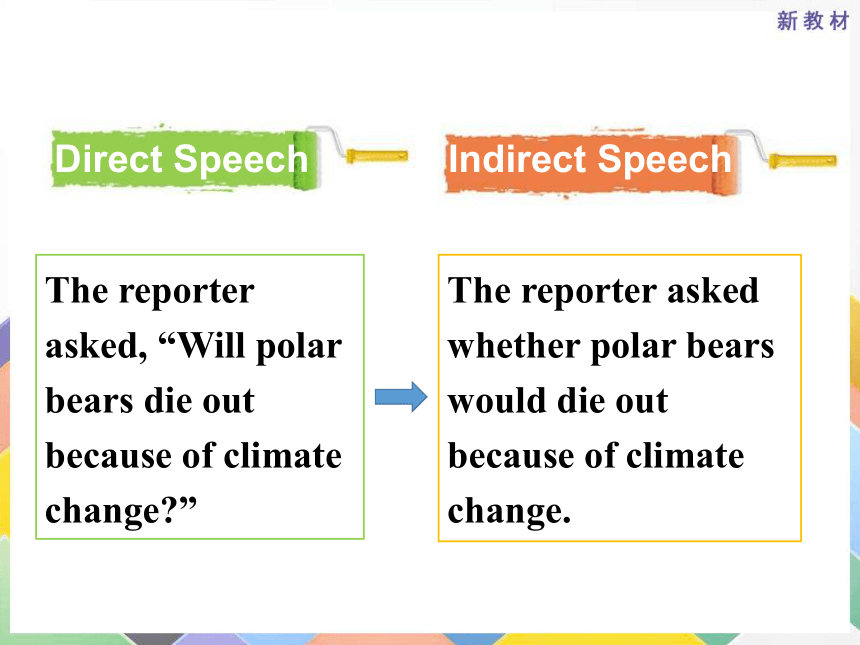
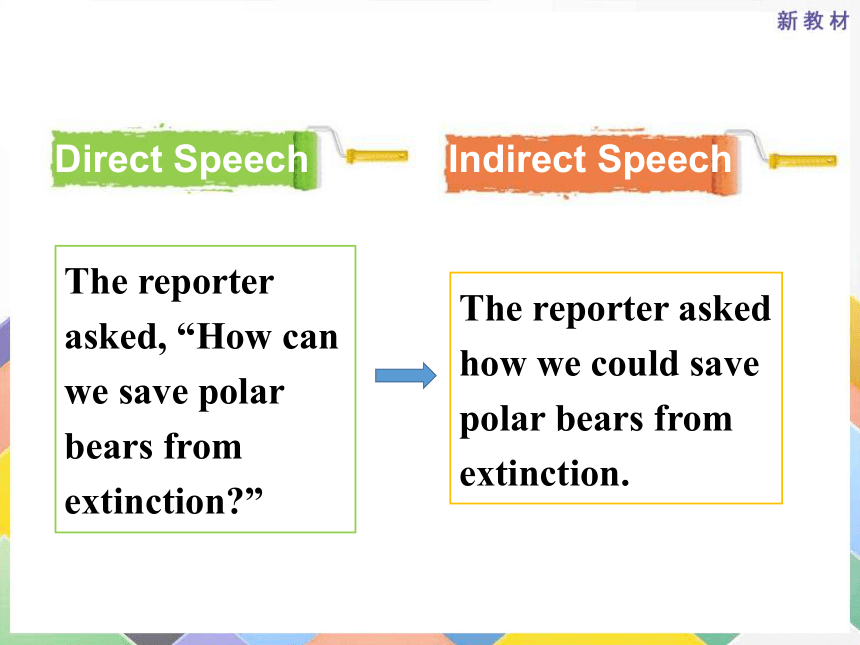
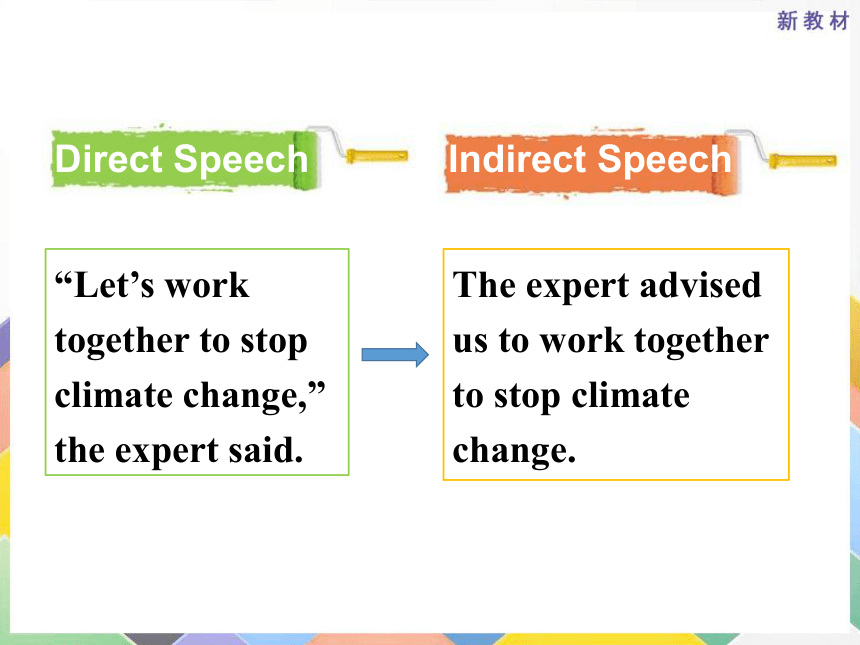
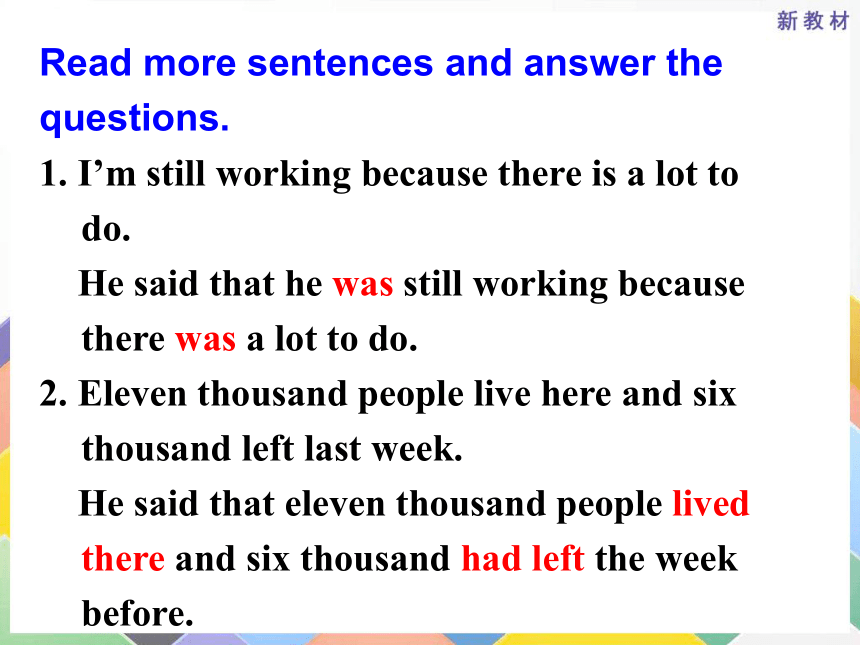
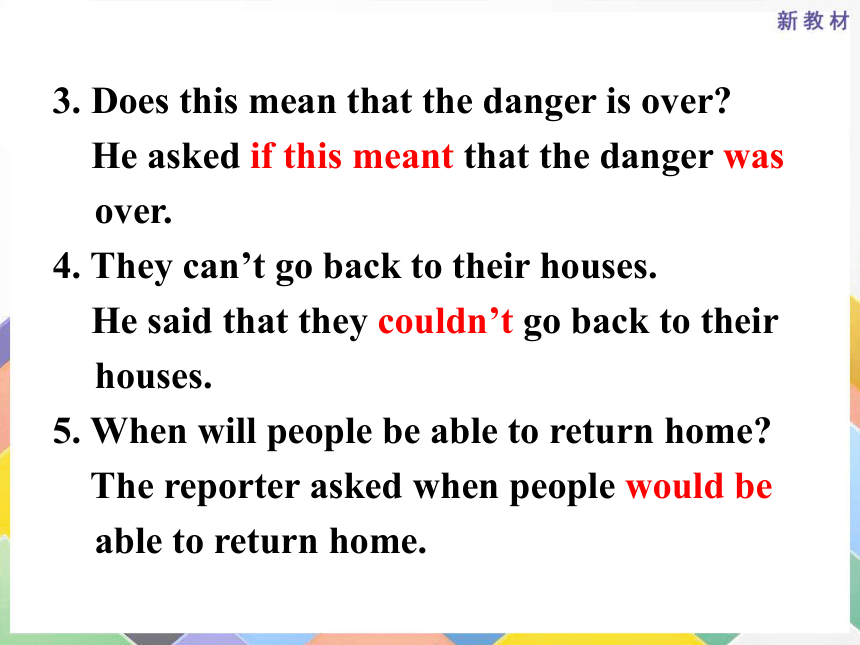
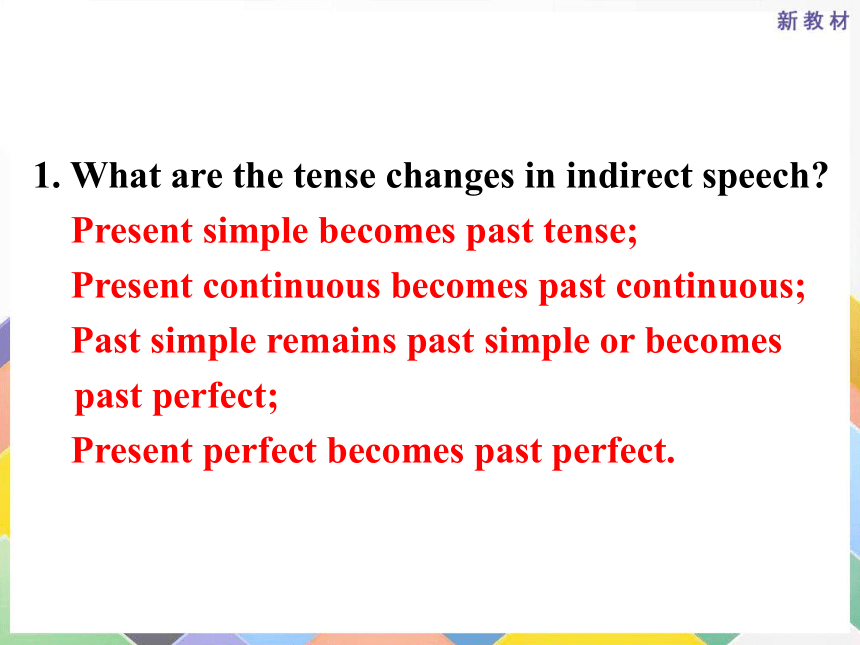
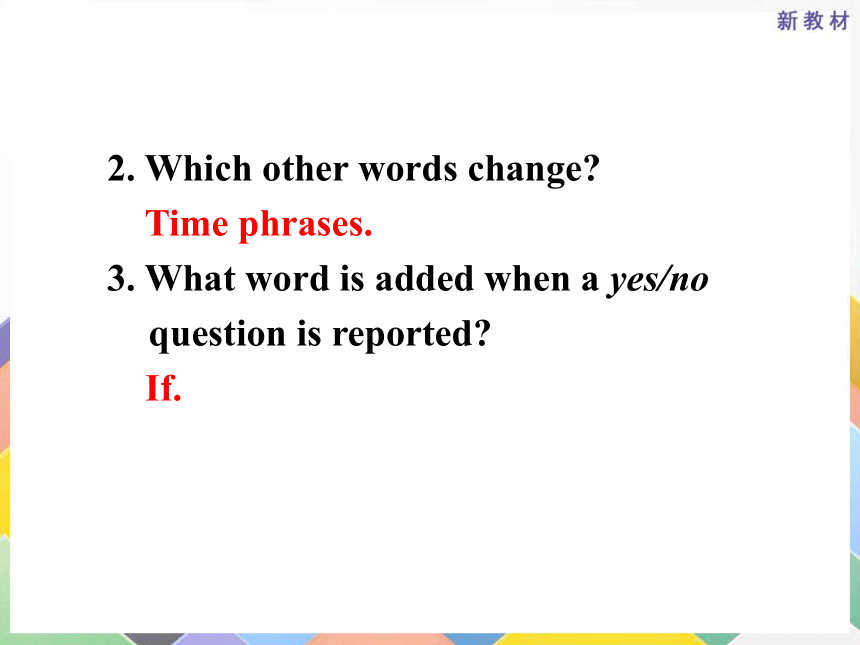
文档简介
(共37张PPT)
UNIT 3
ENVIRONMENTAL
PROTECTION
To analyze the difference in uses and meanings of direct speech and indirect speech.
To practice transforming direct speech and indirect speech.
Look at the sentences in both columns and discuss the differences between each pair. Summarize the rules for changing direct speech into indirect speech.
The expert said that from the position of its dead body, the bear appeared to have starved and died.
The expert said, “From the position of its dead body, the bear appeared to have starved and died.”
Direct Speech
Indirect Speech
The reporter asked, “Will polar bears die out because of climate change ”
The reporter asked whether polar bears would die out because of climate change.
Direct Speech
Indirect Speech
The reporter asked, “How can we save polar bears from extinction ”
The reporter asked how we could save polar bears from extinction.
Direct Speech
Indirect Speech
“Let’s work together to stop climate change,” the expert said.
The expert advised us to work together to stop climate change.
Direct Speech
Indirect Speech
Read more sentences and answer the questions.
1. I’m still working because there is a lot to do.
He said that he was still working because there was a lot to do.
2. Eleven thousand people live here and six thousand left last week.
He said that eleven thousand people lived there and six thousand had left the week before.
3. Does this mean that the danger is over
He asked if this meant that the danger was over.
4. They can’t go back to their houses.
He said that they couldn’t go back to their houses.
5. When will people be able to return home
The reporter asked when people would be able to return home.
1. What are the tense changes in indirect speech
Present simple becomes past tense;
Present continuous becomes past continuous;
Past simple remains past simple or becomes past perfect;
Present perfect becomes past perfect.
2. Which other words change
Time phrases.
3. What word is added when a yes/no question is reported
If.
直接引语和间接引语
引述某人的话可采用两种形式:一种是直接引语,即原封不动地引用原话,将其放在引号内;另一种是间接引语,即用自己的话加以转述,被转述的内容不放在引号内。
陈述句→由that引导的宾语从句,引述动词通常用ask, tell等;
如果直接引语讲的是客观事实或真理,变为间接引语时,时态不变。
eg The teacher said to us, “Light travels
faster than sound.”
→The teacher told us that light travels
faster than sound.
一般疑问句→由连词whether或if引导的宾语从句,其主句谓语动词常用ask, wonder, want to know等。
eg Mother asked me, “Have you finished
your homework ”
→Mother asked me whether/if I had
finished my homework.
选择疑问句→由whether ... or引导的宾语从句。
eg “Are you going to Beijing or Shanghai
for the holidays ” she asked.
→She asked me whether I was going
to Beijing or Shanghai for the holidays.
反意疑问句→由连词whether或if引导的宾语从句。
eg “You don’t like rock music, do you ” he
said.
→He asked me whether/if I liked rock
music.
特殊疑问句→由连接代词或连接副词引导的宾语从句。
eg “How many sleeping pills have you
taken ” asked the nurse.
→The nurse asked me how many
sleeping pills I had taken.
表示请求、劝告、建议等意义的疑问句变为间接引语:suggest + doing或ask/advise +宾语+动词不定式。
eg “What about starting early tomorrow
morning ” Jack said.
→Jack suggested starting early
tomorrow morning.
“Why don’t you take the rest of the day off ” asked my assistant.
→My assistant advised me to take the rest of the day off.
祈使句→动词+宾语+不定式。常见引述动词有tell, order, ask, warn。如果祈使句为否定式,则在不定式前加not。
eg He said to Ann, “Tell me your problem.”
→He told Ann to tell him her problem.
“Be careful with the dog, boys,” she said.
→She warned the boys to be careful with the dog.
“Don’t work in bed, Tom,” she said.
→She told Tom not to work in bed.
【注意】
1. 时态变化
如果主句的谓语动词是一般过去时,直接引语变为间接引语时,从句的谓语动词在时态方面要做相应的变化。
直接引语 间接引语
一般现在时 一般过去时
一般将来时 过去将来时
现在进行时 过去进行时
现在完成时 过去完成时
一般过去时 过去完成时
2. 人称变化
一随主、二随宾、第三人称不更新。
一随主:直接引语中第一人称变为与主句的主语相一致的人称。
二随宾:直接引语中第二人称变为和间接宾语(即听话人)相一致的人称。
第三人称不更新:直接引语中第三人称变为间接宾语时,人称不变。
3. 指示代词、时间状语、地点状语和动词的变化。
直接引语变为间接引语时,指示代词、时间状语、地点状语和某些动词通常要相应变化。
this -- that ;these -- those;now -- then ;tonight -- that night ;tomorrow -- the next / following day;yesterday -- the day before;here -- there;come -- go。
变化项目 直接引语 间接引语
指示代词 this
these
时间状语 now
today, tonight
this week/month…
that
those
then
that day, that night
that week / month …
指示代词/时间状语/地点状语等的变化
yesterday
ten days /weeks…ago
tomorrow/next year..
地点状语 here
方向性 动词 come
bring
the day before
ten days … before
the next day/year…
there
go
take
注意:以上变化要根据实际情况而定,决不能机械照搬。如果就在当天转述,yesterday, tomorrow等时间状语不必改变;如果就在当地转述,here不必变为there。
4. 语序变化
直接引语如果是疑问句,变为间接引语时,要把疑问句语序变为陈述句语序。
Do a survey on what your group members are doing to help the environment and what else they can do. Then report to the class.
Michelle I always use my cloth bag when I go shopping rather than use plastic bags.
Jack I often walk or ride a bike instead of taking a taxi.
Sally Don’t print out documents unless really necessary.
Joe Would it be best to share books with others
I asked my group members what they did to limit the amount of carbon dioxide produced in their daily lives. Jack told me that he often walked or rode a bike instead of taking a taxi. Joe advised us to share books with others. Sally asked us…
直接引语变间接引语需注意:
1. 时态变化
2. 人称变化
3. 指示代词、时间状语、地点状语和动词的变化
4. 语序变化
根据示例,用括号内的词转述下面句子。
Example:
Anna to Janet: Don’t forget to sign the form.
(remind)
Anna reminded Janet to sign the form.
1. Jack: I’ll do my homework after class. (say)
Jack said (that) he would do his homework after class.
2. John: Tom, were you playing football at this
time yesterday (ask)
3. Kate: What is your favorite book, Joe (ask)
John asked Tom if/whether he was playing football at that time the day before.
Kate asked Joe what his favorite book was.
4. Sally: Let’s go to see the film. (suggest)
5. Peter: Come to my house at 8:30 tomorrow,
Neil. (tell)
6. The teacher: Light travels faster than sound.
(say)
Sally suggested going to see the film. / Sally suggested that they (should) go to see the film.
Peter told Neil to go to his house at 8:30 the next day.
The teacher said (that) light travels faster than sound.
将下面的直接引语变为间接引语。
1. The hostess said to me, “Please put your coat in the washing machine.”
The hostess asked me to put my coat in the washing machine.
2. The teacher said, “Come to school on time tomorrow, Tom.”
The teacher told Tom to go to school on time the next day.
3. The doctor said to him, “Don’t drink too much.”
The doctor told him not to drink too much.
4. “Change your dirty uniform,” the boss said to the clerk.
The boss ordered the clerk to change his dirty uniform.
Finish Activity 2 in page 29.
Make 5 sentences by using direct speech and indirect speech.
UNIT 3
ENVIRONMENTAL
PROTECTION
To analyze the difference in uses and meanings of direct speech and indirect speech.
To practice transforming direct speech and indirect speech.
Look at the sentences in both columns and discuss the differences between each pair. Summarize the rules for changing direct speech into indirect speech.
The expert said that from the position of its dead body, the bear appeared to have starved and died.
The expert said, “From the position of its dead body, the bear appeared to have starved and died.”
Direct Speech
Indirect Speech
The reporter asked, “Will polar bears die out because of climate change ”
The reporter asked whether polar bears would die out because of climate change.
Direct Speech
Indirect Speech
The reporter asked, “How can we save polar bears from extinction ”
The reporter asked how we could save polar bears from extinction.
Direct Speech
Indirect Speech
“Let’s work together to stop climate change,” the expert said.
The expert advised us to work together to stop climate change.
Direct Speech
Indirect Speech
Read more sentences and answer the questions.
1. I’m still working because there is a lot to do.
He said that he was still working because there was a lot to do.
2. Eleven thousand people live here and six thousand left last week.
He said that eleven thousand people lived there and six thousand had left the week before.
3. Does this mean that the danger is over
He asked if this meant that the danger was over.
4. They can’t go back to their houses.
He said that they couldn’t go back to their houses.
5. When will people be able to return home
The reporter asked when people would be able to return home.
1. What are the tense changes in indirect speech
Present simple becomes past tense;
Present continuous becomes past continuous;
Past simple remains past simple or becomes past perfect;
Present perfect becomes past perfect.
2. Which other words change
Time phrases.
3. What word is added when a yes/no question is reported
If.
直接引语和间接引语
引述某人的话可采用两种形式:一种是直接引语,即原封不动地引用原话,将其放在引号内;另一种是间接引语,即用自己的话加以转述,被转述的内容不放在引号内。
陈述句→由that引导的宾语从句,引述动词通常用ask, tell等;
如果直接引语讲的是客观事实或真理,变为间接引语时,时态不变。
eg The teacher said to us, “Light travels
faster than sound.”
→The teacher told us that light travels
faster than sound.
一般疑问句→由连词whether或if引导的宾语从句,其主句谓语动词常用ask, wonder, want to know等。
eg Mother asked me, “Have you finished
your homework ”
→Mother asked me whether/if I had
finished my homework.
选择疑问句→由whether ... or引导的宾语从句。
eg “Are you going to Beijing or Shanghai
for the holidays ” she asked.
→She asked me whether I was going
to Beijing or Shanghai for the holidays.
反意疑问句→由连词whether或if引导的宾语从句。
eg “You don’t like rock music, do you ” he
said.
→He asked me whether/if I liked rock
music.
特殊疑问句→由连接代词或连接副词引导的宾语从句。
eg “How many sleeping pills have you
taken ” asked the nurse.
→The nurse asked me how many
sleeping pills I had taken.
表示请求、劝告、建议等意义的疑问句变为间接引语:suggest + doing或ask/advise +宾语+动词不定式。
eg “What about starting early tomorrow
morning ” Jack said.
→Jack suggested starting early
tomorrow morning.
“Why don’t you take the rest of the day off ” asked my assistant.
→My assistant advised me to take the rest of the day off.
祈使句→动词+宾语+不定式。常见引述动词有tell, order, ask, warn。如果祈使句为否定式,则在不定式前加not。
eg He said to Ann, “Tell me your problem.”
→He told Ann to tell him her problem.
“Be careful with the dog, boys,” she said.
→She warned the boys to be careful with the dog.
“Don’t work in bed, Tom,” she said.
→She told Tom not to work in bed.
【注意】
1. 时态变化
如果主句的谓语动词是一般过去时,直接引语变为间接引语时,从句的谓语动词在时态方面要做相应的变化。
直接引语 间接引语
一般现在时 一般过去时
一般将来时 过去将来时
现在进行时 过去进行时
现在完成时 过去完成时
一般过去时 过去完成时
2. 人称变化
一随主、二随宾、第三人称不更新。
一随主:直接引语中第一人称变为与主句的主语相一致的人称。
二随宾:直接引语中第二人称变为和间接宾语(即听话人)相一致的人称。
第三人称不更新:直接引语中第三人称变为间接宾语时,人称不变。
3. 指示代词、时间状语、地点状语和动词的变化。
直接引语变为间接引语时,指示代词、时间状语、地点状语和某些动词通常要相应变化。
this -- that ;these -- those;now -- then ;tonight -- that night ;tomorrow -- the next / following day;yesterday -- the day before;here -- there;come -- go。
变化项目 直接引语 间接引语
指示代词 this
these
时间状语 now
today, tonight
this week/month…
that
those
then
that day, that night
that week / month …
指示代词/时间状语/地点状语等的变化
yesterday
ten days /weeks…ago
tomorrow/next year..
地点状语 here
方向性 动词 come
bring
the day before
ten days … before
the next day/year…
there
go
take
注意:以上变化要根据实际情况而定,决不能机械照搬。如果就在当天转述,yesterday, tomorrow等时间状语不必改变;如果就在当地转述,here不必变为there。
4. 语序变化
直接引语如果是疑问句,变为间接引语时,要把疑问句语序变为陈述句语序。
Do a survey on what your group members are doing to help the environment and what else they can do. Then report to the class.
Michelle I always use my cloth bag when I go shopping rather than use plastic bags.
Jack I often walk or ride a bike instead of taking a taxi.
Sally Don’t print out documents unless really necessary.
Joe Would it be best to share books with others
I asked my group members what they did to limit the amount of carbon dioxide produced in their daily lives. Jack told me that he often walked or rode a bike instead of taking a taxi. Joe advised us to share books with others. Sally asked us…
直接引语变间接引语需注意:
1. 时态变化
2. 人称变化
3. 指示代词、时间状语、地点状语和动词的变化
4. 语序变化
根据示例,用括号内的词转述下面句子。
Example:
Anna to Janet: Don’t forget to sign the form.
(remind)
Anna reminded Janet to sign the form.
1. Jack: I’ll do my homework after class. (say)
Jack said (that) he would do his homework after class.
2. John: Tom, were you playing football at this
time yesterday (ask)
3. Kate: What is your favorite book, Joe (ask)
John asked Tom if/whether he was playing football at that time the day before.
Kate asked Joe what his favorite book was.
4. Sally: Let’s go to see the film. (suggest)
5. Peter: Come to my house at 8:30 tomorrow,
Neil. (tell)
6. The teacher: Light travels faster than sound.
(say)
Sally suggested going to see the film. / Sally suggested that they (should) go to see the film.
Peter told Neil to go to his house at 8:30 the next day.
The teacher said (that) light travels faster than sound.
将下面的直接引语变为间接引语。
1. The hostess said to me, “Please put your coat in the washing machine.”
The hostess asked me to put my coat in the washing machine.
2. The teacher said, “Come to school on time tomorrow, Tom.”
The teacher told Tom to go to school on time the next day.
3. The doctor said to him, “Don’t drink too much.”
The doctor told him not to drink too much.
4. “Change your dirty uniform,” the boss said to the clerk.
The boss ordered the clerk to change his dirty uniform.
Finish Activity 2 in page 29.
Make 5 sentences by using direct speech and indirect speech.
